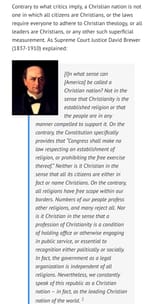
"Inasmuch as the Constitution was never signed, nor agreed to, by anybody, as a contract, and therefore never bound anybody, and is now binding upon nobody; and is, moreover, such an one as no people can ever hereafter be expected to consent to, except as they may be forced to do so at the point of the bayonet, it is perhaps of no importance what its true legal meaning, as a contract, is. Nevertheless, the writer thinks it proper to say that, in his opinion, the Constitution is no such instrument as it has generally been assumed to be; but that by false interpretations, and naked usurpations, the government has been made in practice a very widely, and almost wholly, different thing from what the Constitution itself purports to authorize. He has heretofore written much, and could write much more, to prove that such is the truth. But whether the Constitution really be one thing, or another, this much is certain – that it has either authorized such a government as we have had, or has been powerless to prevent it. In either case, it is unfit to exist."
Is he right? How are constitutions not just a few men declaring their own opinions and will to be the supreme law?
That's a bunch of left-wing gibberish that has nothing at all to do with the real issues with liberalism. In that fool's view it would be impossible for any sort of legitimate government to exist. It's also impossible for liberalism, but at least it attempts to hide this critical flaw by claiming political legitimacy derives from the people. This is deeply wrong, but that doesn't mean republicanism is. The notion that the people can be sovereign in a representative state is wholly reasonable, it's just that their rule isn't self-justifying.
>>17788711 (OP)in civilised countries constitutions have to be approved by the people through a direct vote
>>17788766>In that fool's view it would be impossible for any sort of legitimate government to exist.Is this not true? I cannot think of a government whose philisophical justification stands up to scrutiny. The idea of "the people" is defined by the number of people within an arbitrary border, meeting a set of abitrary requirements and then voting within a system which gives them practically zero influence over the goverment.
>>17788817Did you ever approve of your constitution? No one has agreed to it in a manner free from coercion. Perhaps, at best, some dead men agreed to it, but how does that bind people who did not yet exist?

>>17788711 (OP)>Is he right?He and other anarchists have the right to that opinion, but it doesn't necessarily mean their opinions are right or correct.
>Inasmuch as the Constitution was never signed, nor agreed to, by anybody, as a contract, and therefore never bound anybody, and is now binding upon nobody; and is, moreover, such an one as no people can ever hereafter be expected to consent to, except as they may be forced to do so at the point of the bayonet, it is perhaps of no importance what its true legal meaning, as a contract, is.I would disagree with this by re-affirming that its actual content really matters. Whether or not I'm following the actual content of the Constitution, allows me to successfully establish that I'm demonstrably following it and you are not, and that puts me in a distinctive position of being the one who is following the Law of the Land, as set down by God's providence. Then it only becomes a matter of understanding who is actually following it or not based on what it says.
One of its great purposes is to serve as a fixed landmark that accurately reflects our values as an actual people that historically exist.
>the government has been made in practice a very widely, and almost wholly, different thing from what the Constitution itself purports to authorize.In some cases this may be true, because the government is subordinate to the Constitution. But it will not be successful to argue this point by declaring the entire Constitution to actually be of no importance. Rather, one should show where the difference between reality and the Constitution actually is.
>But whether the Constitution really be one thing, or another, this much is certain – that it has either authorized such a government as we have had, or has been powerless to prevent it.This dilemma is rejected because the Constitution has often corrected the government. You don't flip the table over because the real situation isn't perfect on day one. That's the nirvana fallacy.

